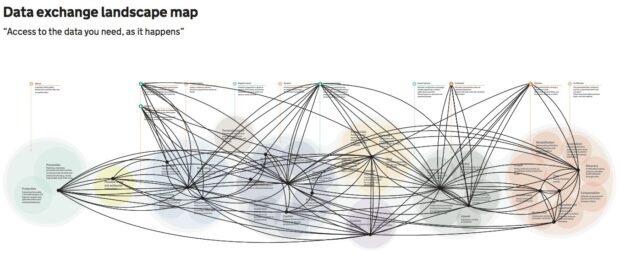Data sharing has long been a contested subject, and rightly so. It’s important that the rules balance privacy and public good.
But currently organisations can’t access each other’s data when and where they need it.
This leads to data being recollected (painful for users), accessed manually (painful for staff) or is not accessed at all (increases risk).
The central recommendation from Digital Justice was that the right data, at the right time would have huge benefits. The whole system could be more efficient, more accurate and fairer for victims.
Most of the data in the justice system is private, personal data – so adherence to data protection law is critical.
However, factors such as ISO27001, audit scrutiny and reputational damage from data leaks have led to cultures biased towards protecting and securing data as opposed to data access.
To readdress this imbalance, we are introducing the role of data stewardship.
| Data Stewardship |
| Data stewardship is the set of responsibilities, combining both protection and sharing, which can be given to organisations within government. |
Data stewardship considers data sharing as an equal responsibility to data protection.
Solving the data spaghetti problem with data sharing principles
The lack of centrally agreed principles across the justice system makes it difficult to take a cross-system approach to data access.

Therefore, working with a cross-department team we have created an overarching set of data principles which aim to encourage organisations to share data more effectively.
At the heart of these principles are two key fundamentals:
- Data is owned at the point of collection or creation and made available to those who need access to it.
- Each identified dataset across justice will have a single team, responsible for both protecting and providing access to data. This role is called the Data Steward.
The 8 data principles for justice
These principles outline a high level agreement on the terms of trade between departments. They do not replace, but rather supplement, existing data legislation.
| 1. Divide and assign responsibility for data | Each dataset within the justice system should be identified and owned by a single team, called the Data Steward. |
| 2. Provide access to data | The Data Steward is responsible for providing access to their data to an identified list of organisations who are entitled to access it. |
| 3. Communicate the risks of data | Data Stewards are responsible for clarifying any risks, responsibilities and necessary confidentialities of using data in line with all legislation for data. |
| 4. Make data free-to-access | Data Stewards bear the financial cost of maintaining integrity and availability of data. Data users should not incur financial cost beyond development work to consume data. |
| 5. Make data high quality | Data Stewards design their own data models, making sure they consider existing standards, and clearly explain their data to others outside their domain. |
| 6. Data standards designed by the stewards | Data Stewards design their own data models, so long as they consider existing standards, and clearly explain their data to others outside their domain. |
| 7. Data aggregation and enrichment can require stewardship | If datasets are combined then this new dataset may require Data Stewardship. Data Stewards must highlight this data is different from the original source. |
| 8. National data stewardship by default | Data Stewardship applies by default to a given dataset across England and Wales. Regional stewardship is only used if regional differences can’t be handled effectively at a national level. |
Summary
Our vision is that data is owned at the point of collection or creation and made available to those who need access to it, when and where they need it.
We believe the data principles for justice will help us realise that vision.
These principles are a long term vision. Although there is broad agreement for them, some organisations are not yet in a position to implement them because of practical barriers that need to be addressed.
True implementation of these data principles could go further than a more efficient, more accurate and fairer justice system.
It could reshape the boundaries and responsibilities of government agencies and departments. Because a system built from on-demand, digitally-accessed data will naturally be organised differently to a justice system powered by slow-to-access paper and manual systems.
